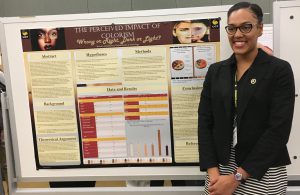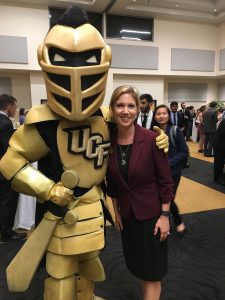Participating in undergraduate research provides students with integrative learning opportunities where they connect the dots between the skills they learn in the classroom and real-world experiences outside of the classroom. Forums such as UCF’s Showcase of Undergraduate Research Excellence (SURE) give students a chance to share their work with diverse audiences. Students explain their research to judges and converse with other students and faculty members. These types of integrative experiences also help students prepare for their future after college, whether that includes attending a graduate program or entering the job market. There are many different ways students can get involved in undergraduate research at UCF, but sometimes the simplest way is through a course assignment.
This year, the Showcase of Undergraduate Research (now in its 14th year) had record number of 443 student participants, presenting 343 projects.
The QEP team wanted to learn more about how students develop research projects that originate in courses they take. We interviewed SURE participant Kendra Castleberry and her professor, Dr. Amy Donley in the Department of Sociology, about developing research in an undergraduate course. We also spoke with Dr. Kimberly Schneider, Assistant Dean of the College of Undergraduate Studies and Director of the Office of Undergraduate Research about ways faculty can support their students’ research.
Kendra participated in this year’s Showcase of Undergraduate Research with her project, “The Depiction of Colorism Friction.” Her project won the Judges’ Choice Award for the Social Sciences category. Kendra spoke with us about how she developed her research, the lessons she learned from working on her project, and her plans after college.

What’s your major, and when do you plan to graduate?
My major is Sociology; I am a transfer student from Valencia College. I am also a senior this year, and I will be walking across the stage on August 5th!
How did you choose your research topic?
I chose this research topic because of the lack of knowledge on the term “colorism.” Many racial groups engage in racial discrimination based off of the color of their skin and do not understand the severity of its exclusion. As I scrolled down my Facebook timeline and Instagram feed, I noticed that people posted jokes and bragged about their skin tone. The phrases used under their captions were “team light skin” or “team dark skin.” This disturbed me, and I wanted to find out how college students at UCF felt about this idea. I wanted to research if this same epidemic prevented students from feeling qualified when searching for jobs.
Do you plan to keep working on this project? If so, what are the next steps/what do you want to do with it?
Yes! I plan on continuing my research in the near future. This was my very first research project. There are so many things that I would like to include. I participated in the Southern Sociological Society Conference, a conference for sociology students, where people from all different colleges and universities have the opportunity to present their research. Since the conference, I have received a lot of positive feedback and suggestions to continue this project. I want to expand my research findings and open up my demographic to different racial groups to research colorism in other regions such as Brazil or Cuba.
What challenges did you encounter during this process, and how did you overcome them?
Due to this being my first research project, everything was trial and error. I am so appreciative of my coworker, professors, and Dr. Donley who helped me figure out how to navigate SPSS (Statistical Package for the Social Sciences) software. The biggest challenge was figuring out what test I needed to run through SPSS in order to get the best results that highlighted my research.
What do you think is the most valuable skill/lesson that you took away from participating in undergraduate research?
The most valuable lesson that I have taken away from participating in undergraduate research is not to make things complicated. Simple is always better. Prior to the showcase I walked around to view some of the posters that were already set up. I began to compare my poster to everyone else’s, and started to think that my poster needed more. I thought maybe I should have added more graphs and tests. After winning Judges’ Choice for the Social Sciences category, I realized that it wasn’t about who had more charts on their board, but it was simply about the clarity of the research, and how to thoroughly explain my findings.
What is one piece of advice that you would offer to students who are thinking about participating in undergraduate research?
My advice to any student who is planning on participating in undergraduate research is to first, find something that interests you. There is nothing more boring than doing research on a topic that you don’t even care about. Also, use your resources. Do not limit yourself in the opportunities that you can use to help develop your research. Lastly, BE CREATIVE! When you design your board choose a color scheme, and think about what would make someone stop and read. Use catchy titles, and just have fun doing it!
What do you plan to do when you graduate?
I applied for the Non Profit Management and Public Administration graduate program at UCF in January. I am still waiting to receive my decision from the program. My goal after graduation is to continue furthering my education.
Dr. Amy Donley, Assistant Professor of Sociology, also talked about how she integrates research assignments into her courses. She stresses the value of providing students with opportunities to engage in independent research in their courses.

Tell us a little bit about yourself.
I am Assistant Professor in the Department of Sociology and Associate Director of the UCF Institute for Social and Behavioral Sciences (ISBS). My research primarily focuses on poverty, food insecurity, and homelessness. One of my current research projects examines the experiences of homelessness among UCF students.
Describe the course that Kendra took with you.
Kendra is a Sociology major, and she took two of the required courses for the major with me (Research Methods and Data Analysis). I have been teaching the Research Methods course and the Data Analysis course at UCF for nine years. They are, without a doubt, my favorite courses to teach as they allow me to work with students on their individual research projects. The courses are a lot of work to teach, but the students see how much it pays off at the end of the spring semester, so it is always worth it for me. Teaching these courses also allows me to work with the same group of students for two consecutive semesters, which is rare.
Describe the assignment in which your students engage in research.
The assignment Kendra completed is really a two-semester-long project. Students must pick a topic, formulate a research question, conduct a literature review, prepare hypotheses, and construct a survey questionnaire (all in Research Methods). In Data Analysis, students collect data using Qualtrics (an online surveying program) and analyze the data. This culminates in a final research paper and a poster highlighting the research.
What do you think is the most valuable skill/lesson that students take away from participating in undergraduate research?
I believe students learn so much from participating in undergraduate research including the ability to synthesize information and critically analyze previous research. However, the most important lesson students learn, in my opinion, is that they can conduct research. They can start at the beginning with struggling to formulate a research question, and then several months later, after lots of hard work and times of frustration, they present the findings of their research. It is an amazing accomplishment that shows students that even though they may not know what they are doing in the beginning, if they persevere and put in the necessary work, they will be successful.
According to Dr. Kimberly Schneider, the research shows that students who engage in undergraduate research experience success in other areas too.

Tell us a little bit about yourself.
I am the Assistant Dean in the Division of Teaching and Learning and Director of the Office of Undergraduate Research. My background is in biology. I am a marine ecologist by training, and my current research interests are in science education and high-impact practices.
What do you think is the most valuable skill students take away from participating in undergraduate research?
Students gain so many hard and soft skills, but I think the most important and relevant skill in today’s society is critical thinking. The ability to critically think through problems and create solutions is transferrable to so many diverse environments.
What do you think is the biggest misconception about undergraduate research?
I think there are two primary misconceptions about undergraduate research. The first is that it is only for honors students. On our campus, this is definitely not the case. The second is that research occurs in laboratory environments. As an office we spend time trying to breakdown these misconceptions to ensure students in all disciplines recognize that they can engage in academic scholarship with our faculty.
What advice would you give to faculty who want to incorporate research assignments into their courses?
Start small and integrate research slowly into classes. Some great first steps are having students read primary literature and summarize articles, attend on-campus research showcases, or have relevant research presentations in the class. Students often don’t even know what faculty do, and what it means to be at a research university.
What are some plans for creating more opportunities for students to participate in research in their classes?
Our division looks forward to working campus-wide to help faculty look for ways to incorporate more high-impact practices (HIPs) into their degree programs, such as research-intensive and service-learning courses, and courses that focus on student professionalization and career readiness. The Signature Experience Initiative is one way we are working to ensure all students benefit from the high quality HIPs offered at UCF by growing or strengthening them into all degree programs. If you are interested in learning more about undergraduate research or the Signature Experience Initiative, email me at krs@ucf.edu.